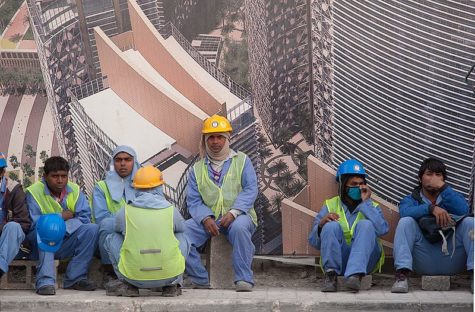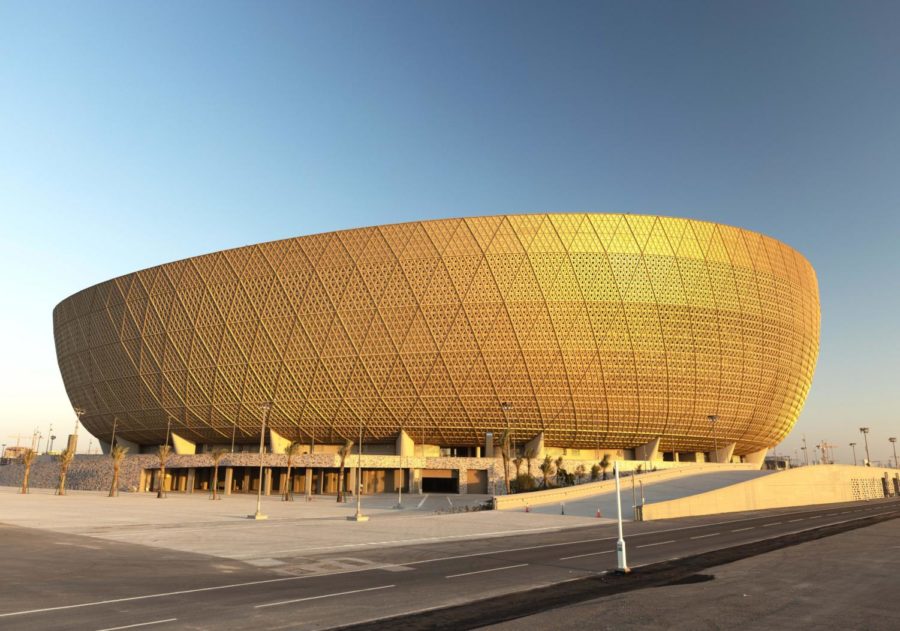The Controversial World Cup: Why the 2022 World Cup Sparked Backlash
The 2022 Men’s World Cup was controversial for several reasons. Here is a look into some of the criticisms of this tournament, specifically the treatment of migrant workers, without whom the 2022 World Cup would not have been possible.
This is Lusail Stadium, one of several stadiums built for the World Cup. It can seat 88,966 people, making it the largest stadium in Qatar.
Soccer is the most-watched sport in the world and, unsurprisingly, the FIFA World Cup is the most-watched sporting event internationally. The host country of the World Cup changes for every tournament. FIFA’s Congress votes on the country that will host, and in 2010, FIFA announced that Qatar was to be the host country for the 2022 World Cup. Qatar was the first Middle Eastern country to host the World Cup, as well as the smallest country to ever host.
This decision was immediately met with criticism from those who believed that Qatar was not a suitable country to host, for a variety of reasons. Sepp Blatter, the former head of FIFA, recently stated that it was a mistake, citing Qatar’s size. “Football and the World Cup are too big for that,” Blatter told the Swiss newspaper Tages Anzeiger in an interview. Others raised some concerns about whether Qatar fairly won the popular vote to host the World Cup.
However, the criticisms of Qatar hosting the World Cup have changed in the last 12 years. What started as concerns over allegations of bribery and Qatar’s lack of sufficient infrastructure have expanded to disapproval over factors such as the treatment of migrant workers in Qatar and the country’s human rights record.
When FIFA’s Congress chose Qatar to host the World Cup, Qatar did not have the infrastructure necessary to host the World Cup at the time, so they underwent massive construction projects, spending over $300 billion. This has made the 2022 World Cup the most expensive one in history.
Qatar hired hundreds of thousands of migrant workers, mostly from South Asian countries, for these massive undertakings. Migrant workers in Qatar make up over 90% of the country’s workforce, and many of them are subject to abuse and exploitation due to their vulnerable positions. The World Cup has brought these injustices to the attention of the public, with some migrant workers speaking out against their working conditions.
Kamal, a scaffolder at Khalifa Stadium, told Amnesty International, “I am fed up with this place. The work is hard, our camp is filthy and small and I haven’t received any pay yet.”
Many migrant workers had to pay expensive recruitment fees just to obtain a job in Qatar. Some people looking to secure jobs in Qatar took out loans just to pay the recruitment fee, hoping that the detriments — leaving their families behind and paying large sums of money just to secure a job — would be outweighed by the benefits of their employment in Qatar.
However, once in Qatar, some employers confiscated their employees’ passports, rendering them unable to leave the country or quit their jobs. “I remember my first day in Qatar. Almost the first thing [an agent] working for my company did was take my passport. I haven’t seen it since,” said Shamim, a gardener at the Aspire Stadium, to Amnesty International.

These human rights violations go deeper than just the World Cup, though. The kafala (sponsorship) system, under which many of these acts occur, has been used in Gulf countries since the 1950s. In Qatar, the kafala system gives employers sponsorship permits to hire workers from foreign nations. It also gives them some degree of control over their employees. Incidents like the ones that workers in Qatar have experienced, such as confiscated passports and withheld wages, are common under the kafala system.
Qatar has introduced some reforms to benefit their workers in response to growing calls to reform the kafala system. A minimum wage was instituted, among other policies. However, some people argue that they are not enough. Families of migrant workers who died due to ‘natural causes’ were unable to receive compensation because their deaths were not investigated. Michael Page, deputy Middle East director at Human Rights Watch, said “Qatar has compensated some migrant workers who have faced serious abuses in recent years, but for many, these programs were created too late and are still a major work in progress.”
According to Guardian analysis, 6,500 migrant workers have died in Qatar over the past decade. This can be attributed to the poor working and living conditions many migrant workers endured. 44-year-old Shambhu Chaudhary immigrated to Qatar from Nepal to work in construction, and helped build Lusail Stadium, where the World Cup was held. He told the New York Times that he and his fellow workers would work in extreme heat and were not paid for two days for every day they were sick. The staggeringly high temperatures in Qatar are what caused the World Cup to be pushed to November, when temperatures are slightly cooler.
Qatari officials have denied that there have been such an extreme number of deaths among migrant workers. Qatar’s World Cup organizing committee has minimized death reports to just 40 related to the construction of stadiums, only three of which are labeled as “work-related.” In an interview with Piers Morgan, Qatar World Cup chief Hassan Al-Thawadi said, “The estimate [of the total migrant workers’ deaths in Qatar in the past decade] is around 400, between 400 and 500.”
The exposition of the devastating conditions migrant workers endured to build infrastructure for the World Cup, as well as Qatar’s human rights record, has cast a shadow on the event for some people. Ryan Kim ’24, who watched the World Cup, said, “I believe that it [the treatment of migrant workers] is unjustified and cruel.” Ciaran Chamberlain, ’24, agreed, stating, “I think it is an abuse of human rights.”
The human rights abuses in Qatar extend beyond the treatment of migrants, though. Some LGBTQ+ fans were hesitant to travel to Qatar since homosexuality is criminalized there. The Human Rights Watch recently reported that security forces in Qatar unjustifiably arrest LGBTQ+ individuals and subject them to cruel treatment, including verbal and physical abuse, as well as forcing them to attend conversion therapy. Though Qatar claimed that any visitors to the country would be welcome, their actions speak louder than their words and LGBTQ+ individuals in Qatar are often unsafe.
In solidarity with the LGBTQ+ community, the captains of several European soccer teams planned to wear “OneLove” armbands at the games. The armbands read “#ONELOVE,” with a heart displaying various colors in between the words. However, on November 20th, FIFA banned the armbands from the games, with Gianni Infantino, the president of FIFA, urging World Cup teams to “focus on the football” and not the ‘politics’ of the situation.

Three Lions Pride, Rainbow Wall, and Pride in Football — three groups for LGBTQ+ soccer fans — issued a joint statement expressing their discontent with FIFA’s response. “Let’s be clear, talking about human rights is neither ideological nor political. It is simply asking for decency and the ability for people to be able to watch their teams without fear of abuse,” the statement read.
Infantino has expressed his disapproval of criticisms concerning the World Cup in other ways as well. In a press conference held before the World Cup began on November 20th, 2022, Infantino stated that the criticism was unfair and hypocritical. “[For] what we Europeans have been doing for the last 3,000 years, we should be apologizing for the next 3,000 years before starting to give moral lessons,” Infantino said.
It is not uncommon for the nations hosting the World Cup to be scrutinized for their actions. For instance, when Russia hosted the World Cup in 2018, the country was not exempt from criticism, whether it was of the treatment of construction workers or other human rights violations. Other host countries faced similar dissent.
This pattern depicts a disturbing trend: while FIFA has been earning billions of dollars from each World Cup, the workers whose labor makes the tournaments possible have been earning far less. These unethical practices can diminish the excitement surrounding the World Cup, but it is important to acknowledge these ethics violations in order to create positive change in the future.
Ryan Kim ’24, who watched the World Cup, said, “I believe that it [the treatment of migrant workers] is unjustified and cruel.”
Marissa Talushllari is an Editor-in-Chief for ‘The Science Survey.' In addition to writing her own articles on a variety of topics, she edits her peers’...

